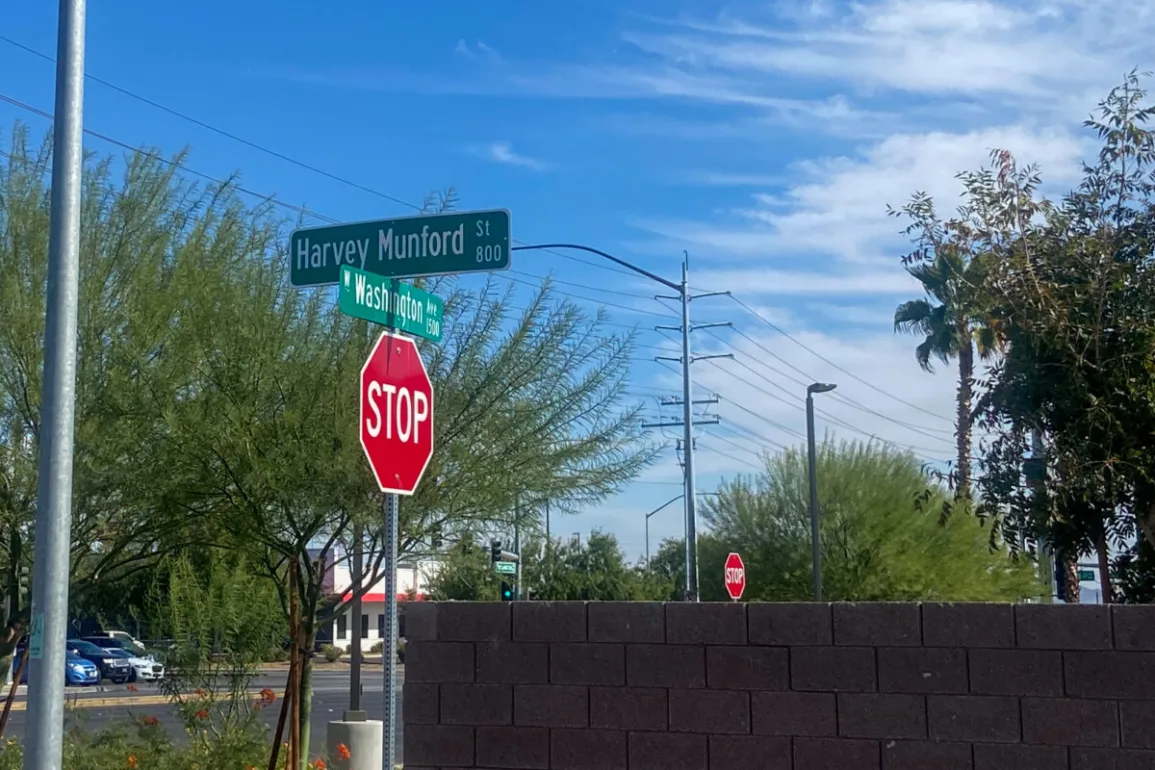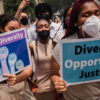Harvey Munford, a six-term Nevada assemblyman and longtime Clark County educator who was a pillar of the West Las Vegas community, died of cancer early Thursday morning. He was 83.
Friends, family and elected officials say Munford leaves behind a legacy of service dedicated to the Historic Westside, championing educational and economic progress in his community and overcoming racism as a Black man in Las Vegas in the 1960s and ’70s.
“He witnessed the struggles. He felt the struggles personally. But at the end of the day he just wanted all of us to come together and be human beings,” Stephen Munford, his son, said in an interview.
In the Assembly, Munford, a Democrat, played a key role in passing legislation that required police to wear body cameras, social studies courses to include multicultural education and the governor to proclaim June 19 “Juneteenth Day” in Nevada. Munford also helped pass bipartisan criminal justice reform measures.
Born in Akron, Ohio, in 1940, Munford was the first Black student at Montana State University at Billings (then called Eastern Montana College). An All-American who played basketball and football, he was eventually inducted into the Montana Football Hall of Fame. Standing 6 feet 8 inches tall, Munford was picked by the Los Angeles Lakers in the 13th round of the 1968 NBA draft, and tried out for the NFL’s Los Angeles Rams.
After his professional basketball career was derailed by a knee injury, Munford moved to Las Vegas in the 1960s, where he worked for more than three decades as an educator, primarily at Bonanza High School, and at the College of Southern Nevada and UNLV. Munford taught history, government and political science.
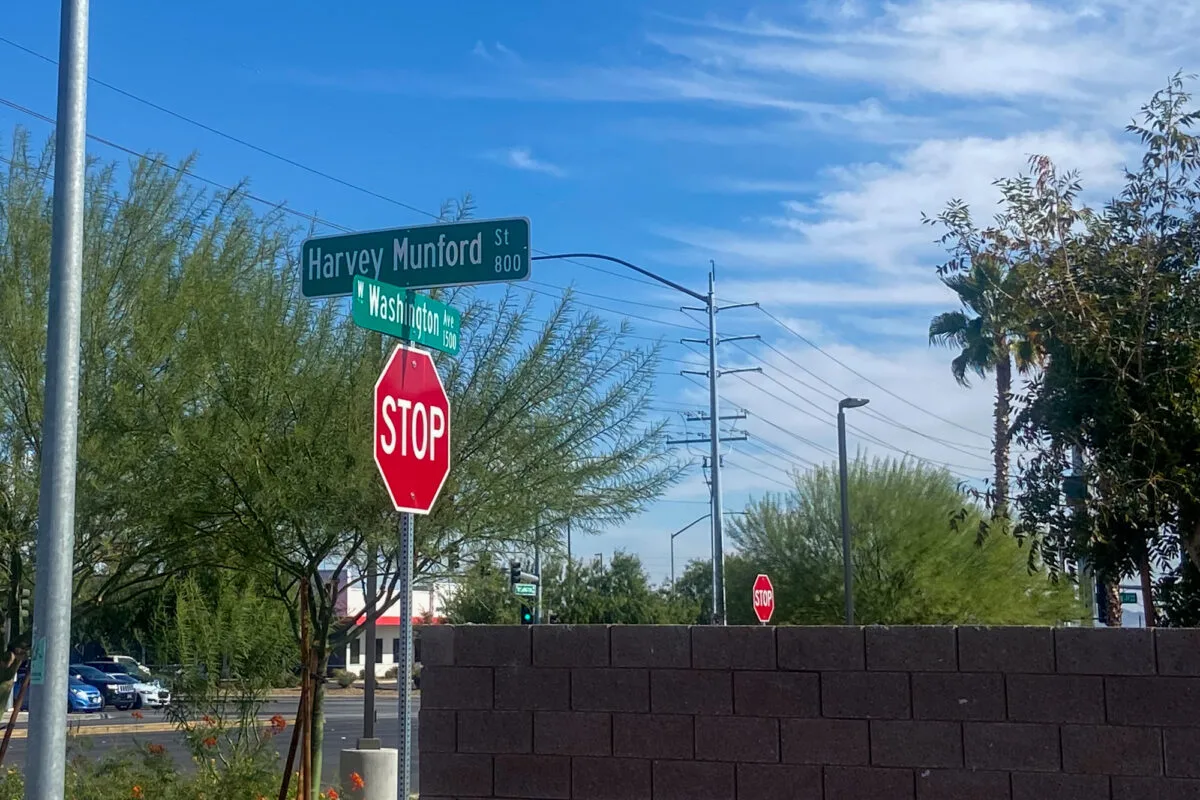
Thousands of students passed through Munford’s classrooms, including some who would later go on to statewide prominence.
Don Ahern, one of Munford’s students, later became the CEO of Ahern Rentals and owner of Ahern Hotel, as well as one of the state’s biggest Republican fundraisers.
Ahern, now nearly 70, recalled meeting Munford at Clark High School.
“We were all kind of frightened. He was like a giant in the hallways, until we got to know him. We found out he was just one of the most wonderful teachers that everybody loved. He really related to kids,” Ahern said.
Munford coached Ahern in basketball and track, and the two eventually became close after discovering that Munford lived near Ahern’s father’s rentals business. They visited often and talked about politics (Ahern later fundraised for Munford), and he later taught Ahern’s children at Bonanza.
Munford was also renowned for turkey giveaways at Thanksgiving and annual Halloween parties that drew hundreds of people to his spacious, ranch-style home near Martin Luther King Boulevard and Washington Avenue, where Munford also owned several horses.
Jamila Munford-Toliver, his daughter, described Munford as her hero whose “heart went into everything that he did.”
In 2000, Munford ran for Assembly District 6, which includes portions of West Las Vegas. He lost that race but ran again in 2004, this time winning his election and going on to serve six consecutive terms in the Assembly as a Democrat.
Vivian Munford, his wife of more than 29 years, said that after Munford won his Assembly race, he told her, “Always remember that we are appointed by the community, meaning we are the servant” for the community.
“The people voted for him. That’s why the house is open. And he always tells me, ‘There is no schedule when people come here,’” she said.
A ‘giant’ in his community
After dropping out of the University of Akron, he was recruited to play at Eastern Montana College, where he was known for his “incomparable leaping,” according to his Montana Football Hall of Fame biography. He met his first wife, a student from the Flathead Indian Reservation, while he was there.
In 2016, Munford spoke with the Billings Gazette about how the assassinations of President John F. Kennedy, Martin Luther King Jr., Malcolm X and Bobby Kennedy in the 1960s had shaped him as a young man. The pressure he faced at Billings as his college’s first Black student included being told not to date white women.
Though his sports career was dashed by a knee injury, Munford earned a bachelor’s degree in biology and physical education and master’s degree in counseling and political science, according to his legislative biography.
He moved to Las Vegas in 1966 to become a teacher because the school district was seeking Black educators. Stephen recalled that his family was nearly blocked from moving into their first apartment across from Clark High School because of Munford’s race, only securing the apartment after intervention from the school’s white principal.
Billy McCurdy, a Las Vegas pastor and campaign media consultant who met Munford in the late 1960s and later helped with his Assembly campaigns, said the two met through the Las Vegas Teen Democratic Club West.
McCurdy described Munford as dedicated to the revitalization of the Historic Westside, including in the wake of the 1992 West Las Vegas riots that followed the police killing of Rodney King in Los Angeles.
“He was a tall giant in this community. Everybody looked up to Harvey,” McCurdy said.
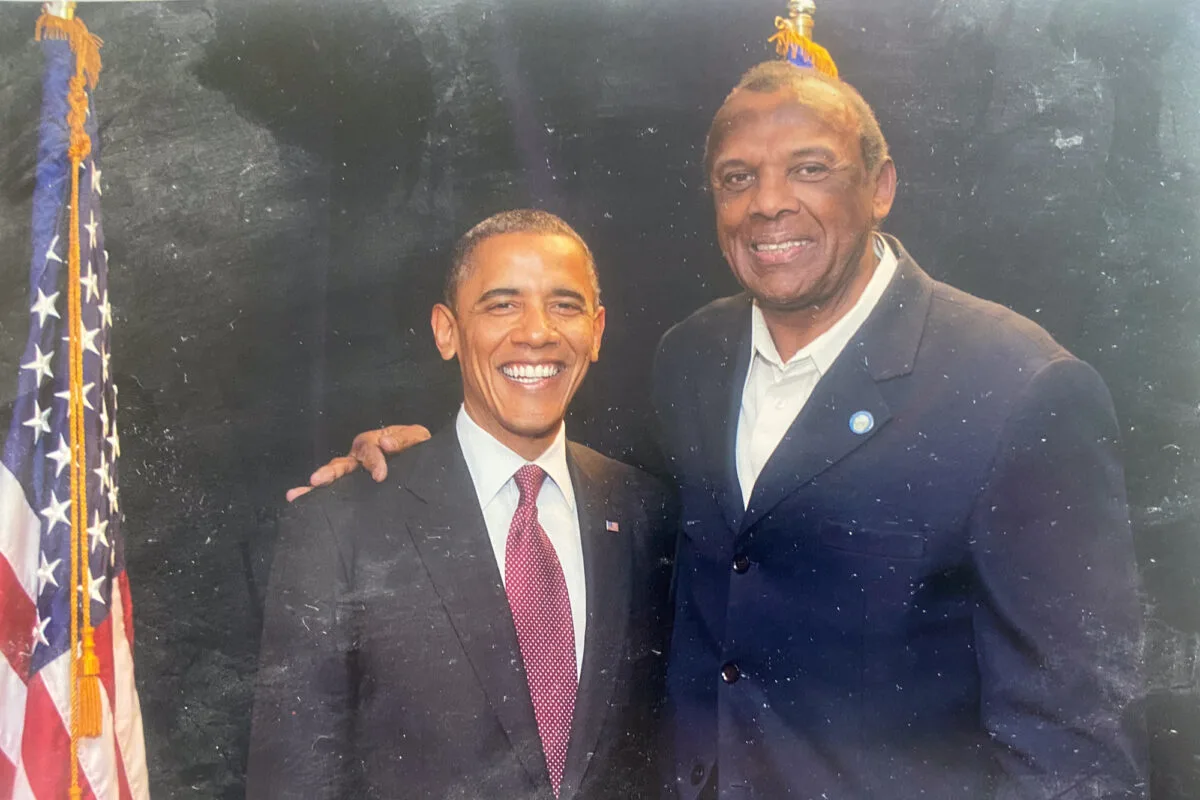
Tributes to Munford poured in after his death, including from Sen. Catherine Cortez Masto (D-NV), Rep. Susie Lee (D-NV) and Nevada Republican Party Chairman Michael McDonald. In a statement, Attorney General Aaron Ford, a Democrat who was the first African American to hold statewide constitutional office in Nevada, remembered Munford as a “trailblazer.”
“His efforts in the Legislature and the state are more than commendable,” Ford said. “We’ll sorely miss him.”
Vivian recalled leaving Munford alone when the two went grocery shopping because community members would constantly stop him to chat. Stephen recalled a time he spent four hours at his father’s house, and during that time, there were “five or six people that came through the door, all of them his ex-students” he said, noting that Munford gave them money for diapers or rent.
“He was always community oriented,” Stephen said.
Known for supporting some conservative candidates, such as former Assemblywoman Michele Fiore in her run for Las Vegas City Council, Munford contemplated switching parties toward the end of his legislative career. He said at the time that he felt unfairly overlooked by Assembly Democrats for a leadership position, the Reno Gazette-Journal reported in 2015, but ultimately remained a Democrat.
“He always had an open mind and talked to anybody, no matter if you’re a Republican, Democrat or third party,” Stephen said.
Munford remained dedicated to the West Las Vegas community after terming out of office, including unsuccessfully seeking a seat on the Las Vegas City Council in 2018. He was also involved in trying to revive the historic Moulin Rouge, the country’s first major desegregated hotel-casino.
Prior to his death, he participated in ceremonies honoring his legacy in West Las Vegas, including the renaming of Sunny Place, the road he lived on for decades, as Harvey Munford Street in November 2022.
“I know that it meant the world to him,” Jamila said. “So many people, they tell me stories of ‘If it wasn’t for your dad, I wouldn’t have done this, or I wouldn’t have done that … He helped guide me.’ That’s who he was.”
Munford witnessed the addition of an honorary plaque at Historic Westside Legacy Park — recognizing his work in paving the way “to the revitalization of the Historic Westside of Las Vegas and teaching multicultural education in K-12 schools.” Stephen said Munford “believed that it was important for all of us to understand our history so that we could be united.”
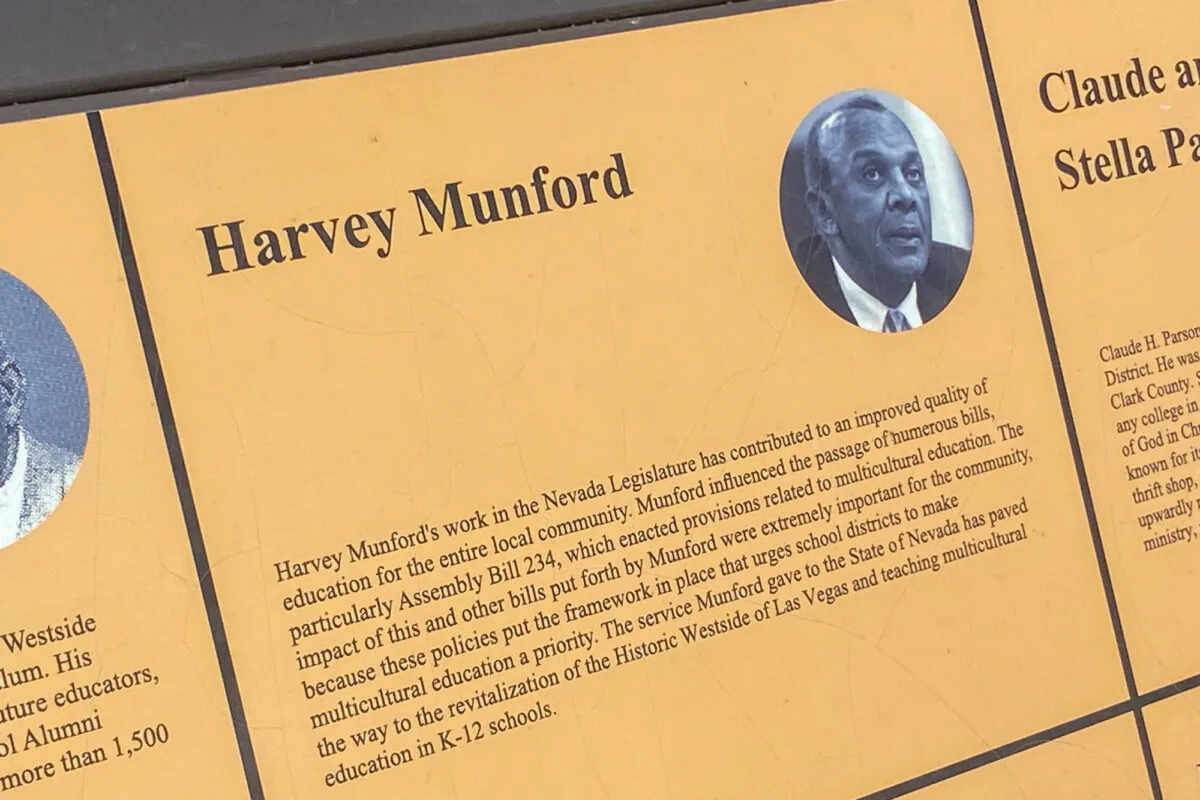
Outside teaching and politics, Munford was regarded for his height and basketball skill. Stephen retold the story of his father’s first run-in with legendary UNLV coach Jerry Tarkanian.
At the time, Munford was teaching at UNLV. Stephen said that as his father was walking across campus, he heard a man yelling at him and then saw a “short white guy” running up behind him.
“My dad’s six-eight, and so [Tarkanian] comes up and says, ‘You play basketball?’ He said, ‘Yeah, but I’m not eligible to play college anymore,’” Stephen said.
A father and husband
Munford is survived by his children, Stephen and Jamila, his wife, Vivian, and her three children, Vivian, Helen and Donna, as well as several grandchildren. He was one of four siblings, with brothers Harold and Henry and sister Sandra.
Jamila, now an accountant in the gaming industry, said her father gave her and stepsister horseback riding lessons, telling her that she was a “Western cowgirl just like” he was a cowboy. She also said Munford taught her the importance of education.
“He said, ‘No one can ever take that from you,’” Jamila said.
Stephen, who works as a property manager and commercial broker in Las Vegas, said his father “was always a hard worker,” including working part time as a table games dealer and owning a driving school. It was there he met Vivian, his third wife.
Vivian, a nurse, said she met Munford in 1990. After emigrating from the Philippines and divorcing her first husband, she wanted to learn to drive and met Munford as her instructor.
“I do not know if it’s love, but my heart beats so fast,” she recalled. “It’s something like love at first sight.”
After dating for several years, the two married in 1994. Vivian described Munford as a kind man who acted as a father to her children.
She supported Munford’s political career, as their house became a destination for political events and meet-and-greets for dignitaries such as former Vice President Al Gore.
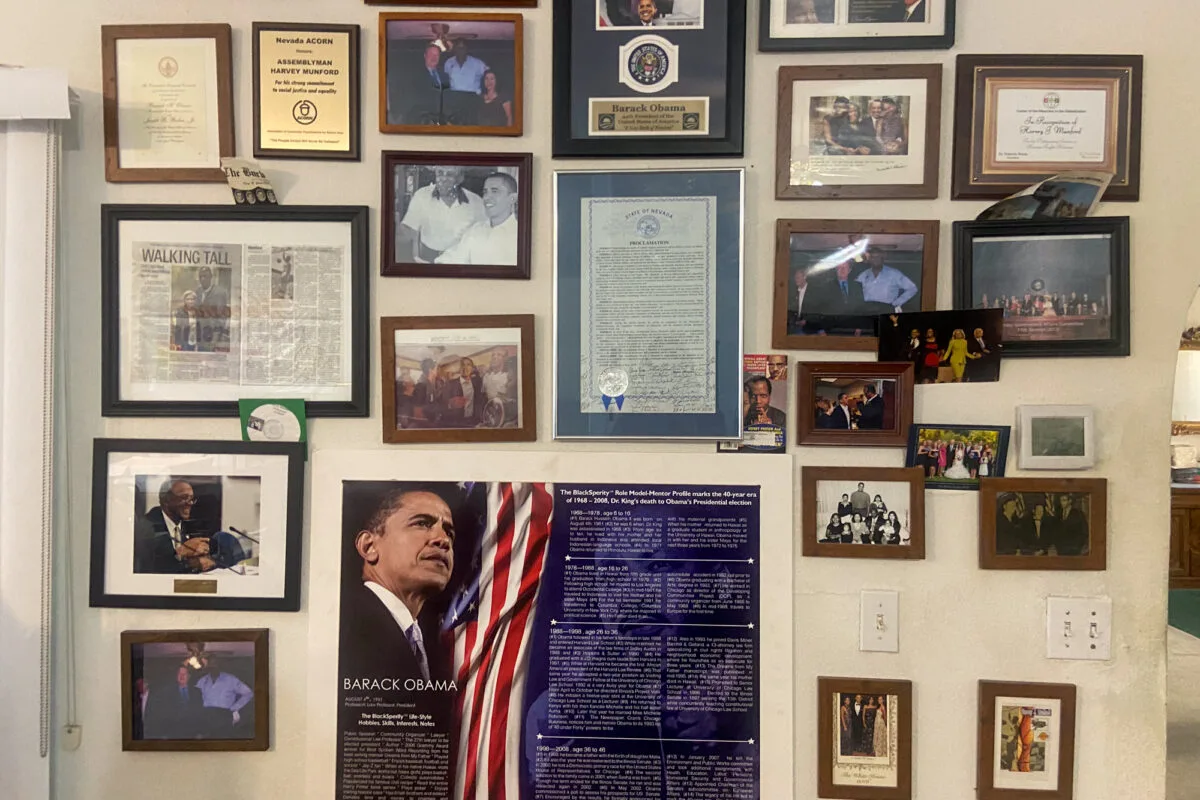
A wall in their house is decorated with mementos from Munford’s time in politics — photos of him in the Legislature and of him with former President Barack Obama and former Secretary of State Hillary Clinton.
Vivian, 74, said she had expected Munford, who was nearly 10 years older, to die before her, and had prepared him for that reality.
“If something happens to you, this is my promise. I said that, ‘Nobody could replace you in my heart. You are a good man,’” she said.


